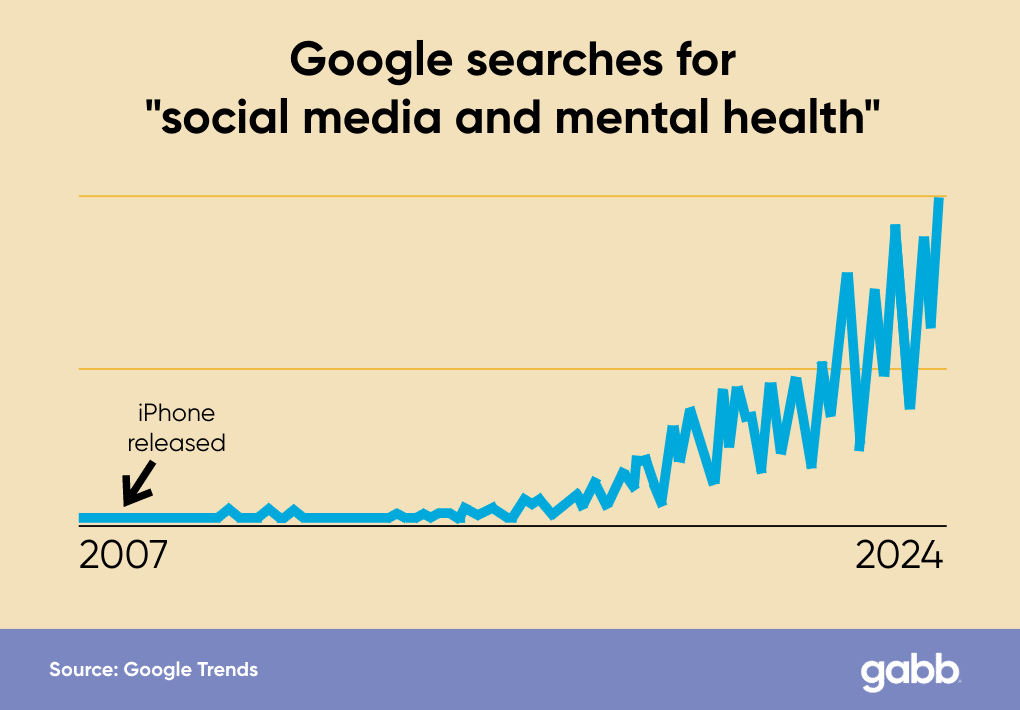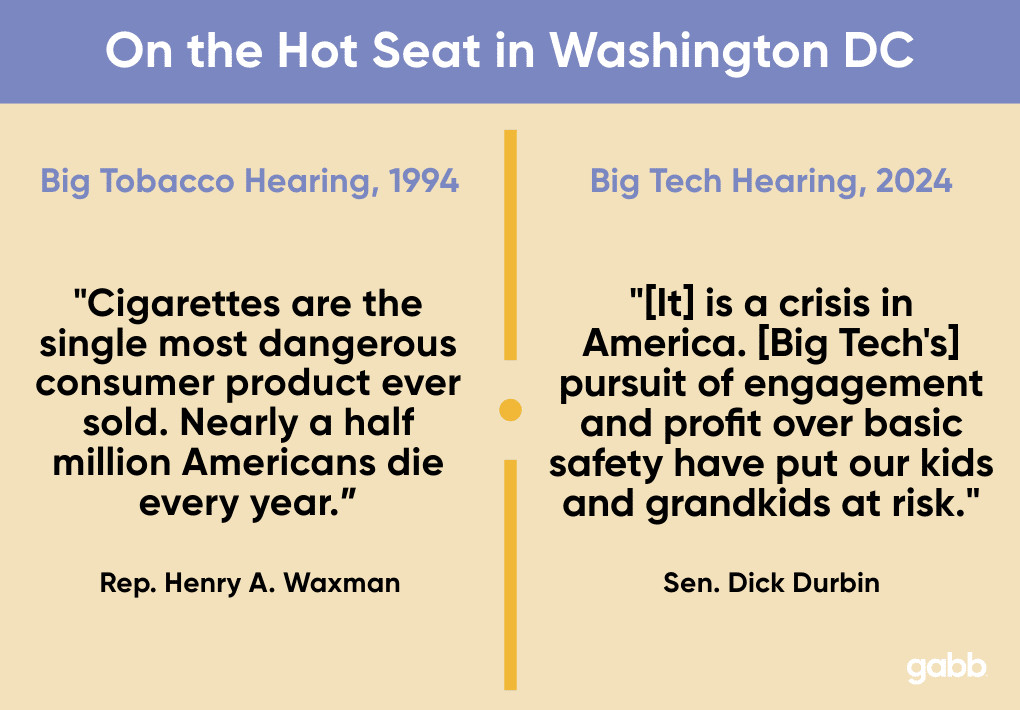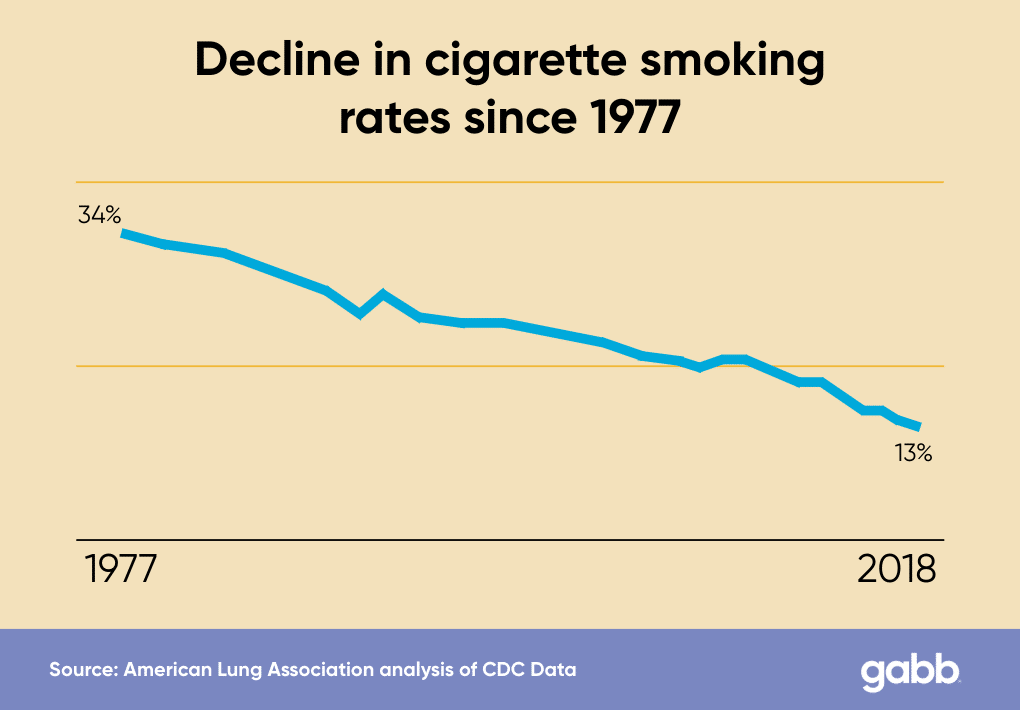Whoever coined the phrase, “it takes a village to raise a child” probably lived in an actual village. Very few of us live in villages today but the phrase persists because the idea still applies — even if the “village” helping to raise our children looks quite a bit different than it did in previous generations.
Today’s village is almost as digital as it is physical, so our neighbors now include mental health experts, TikTok influencers, and pedophiles. Everyone with access to the internet has the ability to shape internet safety — and, by extension, our kids.
Between companies like Gabb promoting safe-tech products, documentaries like The Social Dilemma, and the U.S. Surgeon General issuing an official social media warning, word is getting out. Conversations on the dangers of digital tech are reaching mainstream status.

Parents have worried about this stuff for a while, they just didn’t have a lot of evidence to back up those worries. The concerns about passing down an old iPhone or saying yes to a kid’s request for this app or that video game have been vague and hard to quantify. Not anymore. More than a decade has passed since smartphones became ubiquitous and the results (both good and bad) have started to calcify.
The era of naively staring in awe at the innovation landing in the palm of our hand looks to be coming to an end. We now have the information we need to start sifting through this unprecedented technological harvest. That doesn’t mean, however, that the task will be easy. One of the fundamental questions guiding that sifting is how each member of today’s digital village can and should keep our kids safe online.
Parents are ultimately responsible for their own children, but what role should the corporations who create the technology we all use be playing? What about the politicians and judges with power to outlaw certain dangers? Or the teachers who we already rely on for so much of our kids’ development?
Spoiler alert: There probably isn’t an easy answer.
But understanding what each of those groups can do is helpful as a parent. It puts us in a better position to push for the linking-of-arms needed to protect the thing that will literally decide the future of this crazy world we live in: our kids.
Big Tech’s Role in the Problem
Big Tech (the common nickname for leading tech companies like Google, Amazon, Apple, Meta, and Microsoft) can impact our kids’ safety in two basic, but extremely important, ways:
1) with the products they make and distribute by the billions, and
2) their level of transparency about the impact of those products.
In both regards, it’s starting to look more and more likely that Big Tech and Big Tobacco have more in common than their nicknames.
The problem with Big Tobacco (leading cigarette companies) wasn’t just that they made an addictive product that harmed millions. It was that they knew it and lied about it. We still don’t know whether Big Tech’s guilt matches Big Tobacco’s. But the Big Tech story is looking eerily similar.

The two issues are not identical. The Big Tech dust is just now getting kicked up so we’ll have to see what it looks like when it settles. But mounting evidence, like the “Facebook Files” and the leak of Meta’s own research showing they’ve known about the problems, is one reason another member of today’s digital village has started to assert itself more aggressively.
The Government v. Big Tech
It’s hard to even find an accurate figure on the total number of lawsuits filed against Big Tech in the past couple years. Key cases include more than 200 school districts suing major social media companies, dozens of U.S. states taking legal action against Meta, and a handful of states passing bold legislative measures.

Unsurprisingly, Big Tech isn’t going down without a fight. Legal actions to regulate social media use among minors are facing big legal hurdles, mostly in the form of lawsuits that challenge the constitutionality of these new laws (via NetChoice, a trade organization set up by major social media companies to represent their interests).
These apps and platforms have become so enmeshed in modern life that it is proving tricky to pinpoint where and how to insert protections. Questions about state versus federal jurisdiction and concerns regarding privacy form part of the problem, but the key constitutional principle at play in Big Tech’s pushback is a claim for free speech rights under the First Amendment.
An oversimplified analogy for the free speech claim is that the internet is the modern equivalent of the old town square where a community’s public information would be freely shared and received. So barring members of the community from entering the square strips them of an inalienable right.
It’s a debate of where to draw the line between overly restrictive regulations that could stifle innovation and infringe on free speech on the one hand, and regulatory oversight and legislative measures that hold tech companies accountable for real harm being caused to vulnerable populations (i.e. kids) on the other. There are reasonable people on both sides trying to push that line one way or the other.

Florida is a good recent example. On March 25th, Florida Governor, Ron DeSantis, signed a social media bill that prevents Florida kids under the age of 14 from having social media accounts. For kids aged 15 and 16, parental consent will be required.
Even for this specific bill, it took some time to get the final signature. Governor DeSantis rejected earlier versions of the bill due to concerns about whether the Florida state government was assuming decision-making on a matter — whether a kid is ready for social media — that parents should ultimately determine. After weeks of back-and-forth, the bill was revised to a point where DeSantis was satisfied a good balance was struck and he signed it into state law.
But the story isn’t over. The widely-held expectation is that this law will be challenged as unconstitutional and will then have to weave its way through the federal court system.
We’ll see what happens, but it’s a good microcosm for the role of government in keeping kids safe online.
Florida has also grabbed headlines for being the first state to enact legislation cracking down on phones in schools, which blurs the line between government and another key member of today’s digital village: teachers.
Phones in Schools
The current debate over phones in schools is exactly that: a debate.
Some argue that technological advancements have historically proven very useful in education and smartphones offer some of the best technology available today. They can be effective learning aides, in other words, so we shouldn’t ban them. Some parents and students also argue for the peace of mind that comes with knowing they can contact each other whenever needed.
Others argue that those benefits are outweighed by the drawbacks, mainly in the form of distractions and cyberbullying. Teachers are feeling this keenly and many are speaking up in favor of bans.
You’d be hard pressed to find a school out there that doesn’t have some sort of rule in place around phone use in the classroom. Increasing numbers of states are working on legislation and there’s even discussion at the federal level.
The point? Pretty much everyone involved recognizes there are problems but no one has figured out the best way to solve them so that kids get the best of tech without being harmed by the worst of it.
What’s a Parent to Do?
This can feel like a lot to take on as a parent. Big Tech alone represents trillions of dollars in power and influence so it’s understandable that many parents feel powerless by comparison. But that isn’t true.
The first thing we can do is simple: keep our own kids off their products until we’re confident they know about — and can navigate — the dangers.
I know this is easier said than done. The pressure parents feel is no small thing. Raise your hand if you’ve ever felt like saying “yes” to an app or game was bad parenting but saying “no” was also bad parenting because your child would be excluded and/or made fun of if they didn’t get on it.
“If you’ve never wept and want to, have a child.”
– David Foster Wallace
The answer doesn’t have to be as extreme as digital abstinence. Tech brings so many benefits that our kids can and should take advantage of. That’s not to mention the inescapability of at least some amount of tech our kids will eventually need to use as adults.
As one dedicated soul discovered, it’s nearly impossible to live a normal life today without using something that is owned by one of the five biggest tech companies. But there’s a big difference between buying some sunglasses from a website that runs on Amazon Web Services and spending 4 hours/day on Instagram, which just so happens to be facilitating the world’s largest network of pedophiles.
So maybe we start with keeping our kids away from the stuff that’s most likely to harm them?
Keeping your own family off of unsafe apps might not change the course of multi-billion dollar corporations, but it will keep your kids safer. And sticking to that decision when you have conversations with other parents might have more of an impact than you realize.
Remember the social pressure we mentioned just a few lines ago? Imagine we get to a point where your kid can’t use the “all my friends are on it” argument anymore because all of their friends’ parents also decided they’ve had enough of the risks. Imagine being a parent in a community where it is commonly accepted that kids are better off interacting in person and staying off of social media until their late-teens.
That kind of grassroots momentum does have the potential to impact big corporations. The Great American Smokeout of the late 1970s was a movement centered in schools and carried out largely by kids, and the CDC estimated it led to 3.3 million smokers quitting.

Just as Big Tech might seem untouchable by us mere parents, it’s easy to assume we’re powerless to exert serious influence on new tech laws. I’m no political scientist but isn’t it true that in any democratic system, the word government means “we,” not “they?” Our democratic republic was designed to give us all a voice.
How does that translate to parenting? And specifically your parenting?
I don’t think it means we all have to run for office, become active PTA members, or post weekly rants on Facebook. In a time where parenting can feel as competitive as the extracurricular activities our kids are involved in, the good news is this can look very simple for most of us.
Simply speak up. Do your best to stay looped in on the big news stories then talk about them with the people you already talk to — neighbors, siblings, friends, your kids’ teachers, your kids’ grandparents, and (especially) your kids. If you’re active on social media platforms where this stuff is being discussed, discuss it there as well. If you’re not, don’t feel pressure to be.
You might not feel like your own circles stretch very widely but in our interconnected digital world it’s impossible to predict the ripple effects of a good idea. And making it easier for everyone around you to be a little more thoughtful and intentional about how kids are using technology is a very good idea.
Let Us Know What You Think
Join the discussion right here! Leave a comment below.









Success!
Your comment has been submitted for review! We will notify you when it has been approved and posted!
Thank you!